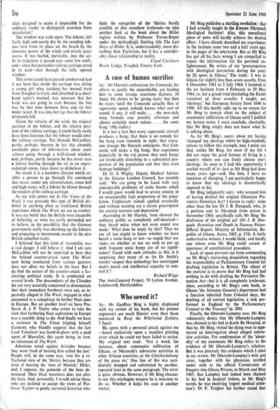A case of human sacrifice
Sir: Mr Hurren's enthusiasm for Concorde, his efforts to justify the unjustifiable, are leading him to some strange assertions (Letters, 14 June). He claims to be 'giving facts,' but then he states 'until the Concorde actually flies at supersonic speed, nobody knows what sort of sound, if any, it will make . . . the new-style wing formula may possibly eliminate and almost certainly much reduce . . . the sonic bang.' (My italics.) Is it not a fact that every supersonic aircraft produces a bang; that there is no remedy for the bang even remotely in sight; that every- one (except Mr Hurren) anticipates that Con- corde will make a big bang; that experience (especially in the us) proves that such bangs are intolerably disturbing to a substantial pro- portion of the population and that they even damage buildings?
Dr G. S. Wigley, Deputy Medical Adviser to the Greater London Council, has recently said : 'We are going to be faced with very considerable problems of sonic booms which I would guess would lead to severe anxiety in an unacceptably high proportion of the popu- lation. Unpleasant stimuli applied erratically and without warning are a classic prescription for anxiety neurosis and depression.'
According to Mr Hurren, 'tests showed the ordinary public as completely self-deceived- they heard noise when not even sound was made.' What does he imply by this? That we are all too stupid to know whether we have heard a sonic bang or not—so stupid that our views on whether or not we wish to put up with frequent sonic bangs are of no signifi- cance? Faced with such attitudes as this, is it surprising that many of us (in Dr Smith's words) 'suspect that technology has outstripped man's moral and intellectual capacity to con- trol it'?
Richard Wiggs The Anti-Concord Project, 70 Lytton Avenue, Letchworth, Hertfordshire






































 Previous page
Previous page